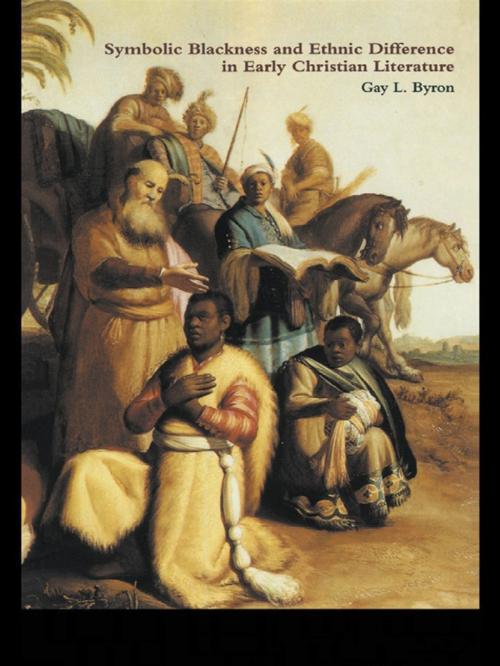Symbolic Blackness and Ethnic Difference in Early Christian Literature
BLACKENED BY THEIR SINS: Early Christian Ethno-Political Rhetorics about Egyptians, Ethiopians, Blacks and Blackness
Nonfiction, Religion & Spirituality, Other Practices, Ethnic & Tribal, Fiction & Literature, Literary Theory & Criticism, American, History, Ancient History| Author: | Gay L Byron | ISBN: | 9781134544004 |
| Publisher: | Taylor and Francis | Publication: | October 4, 2003 |
| Imprint: | Routledge | Language: | English |
| Author: | Gay L Byron |
| ISBN: | 9781134544004 |
| Publisher: | Taylor and Francis |
| Publication: | October 4, 2003 |
| Imprint: | Routledge |
| Language: | English |
How were early Christians influenced by contemporary assumptions about ethnic and colour differences?
Why were early Christian writers so attracted to the subject of Blacks, Egyptians, and Ethiopians?
Looking at the neglected issue of race brings valuable new perspectives to the study of the ancient world; now Gay Byron's exciting work is the first to survey and theorise Blacks, Egyptians and Ethiopians in Christian antiquity.
By combining innovative theory and methodology with a detailed survey of early Christian writings, Byron shows how perceptions about ethnic and color differences influenced the discursive strategies of ancient Christian authors. She demonstrates convincingly that, in spite of the contention that Christianity was to extend to all peoples, certain groups of Christians were marginalized and rendered invisible and silent.
Original and pioneering, this book will inspire discussion at every level, encouraging a broader and more sophisticated understanding of early Christianity for scholars and students alike.
How were early Christians influenced by contemporary assumptions about ethnic and colour differences?
Why were early Christian writers so attracted to the subject of Blacks, Egyptians, and Ethiopians?
Looking at the neglected issue of race brings valuable new perspectives to the study of the ancient world; now Gay Byron's exciting work is the first to survey and theorise Blacks, Egyptians and Ethiopians in Christian antiquity.
By combining innovative theory and methodology with a detailed survey of early Christian writings, Byron shows how perceptions about ethnic and color differences influenced the discursive strategies of ancient Christian authors. She demonstrates convincingly that, in spite of the contention that Christianity was to extend to all peoples, certain groups of Christians were marginalized and rendered invisible and silent.
Original and pioneering, this book will inspire discussion at every level, encouraging a broader and more sophisticated understanding of early Christianity for scholars and students alike.















